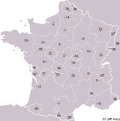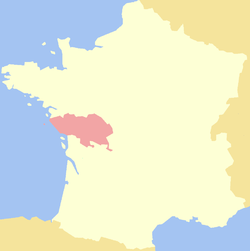- Poitou
-
Poitiers 
Flag
Coat of armsCountry France Area – Total 19,709 km2 (7,609.7 sq mi) Population (2006 estimate)
Residents known as Poitevins[1]– Total 1,375,356 Time zone CET Count 638—677, Guérin de Trèves
1403—1461, Charles VII of FrancePoitou (French pronunciation: [pwatu]) was a province of west-central France whose capital city was Poitiers.
The region of Poitou was called Thifalia (or Theiphalia) in the sixth century.
There is a marshland called the Poitevin Marsh (French Marais Poitevin) on the Gulf of Poitou, on the west coast of France, just north of La Rochelle and west of Niort.
Many of the Acadians who settled in what is now Nova Scotia beginning in 1604 and later to New Brunswick, came from the region of Poitou. After the Acadians were deported by the British beginning in 1755, a number of Acadians eventually took refuge in Poitou and in Québec. A large portion of these refugees also migrated to Louisiana in 1785 and following years became known as Cajuns (see Cajuns).
Perhaps paradoxically, during the late sixteenth and early seventeenth centuries Poitou had been a hotbed of Huguenot (French Calvinist) activity among the nobility and bourgeoisie and was severely impacted by the French Wars of Religion (1562–1598).
Post revocation of the Edict of Nantes in 1685, a strong counter-reformation effort was made by the French Roman Catholic Church, this in part was subsequently in 1793 responsible for the three year long open revolt against the French Revolutionary Government in the Bas-Poitou (Département of Vendée). Indeed during Napoleon’s Hundred Days in 1815, the Vendée stayed loyal to the Restoration Monarchy of King Louis XVIII and Napoleon was forced to send 10,000 troops under General Lamarque to pacify the region.
As noted by Lampert, "The persistent Huguenots of 17th Century Poitou and the fiercely Catholic rebellious Royalists of what came be the Vendée of the late 18th Century had ideologies very different, indeed diametrically opposed to each other. The common thread connecting both phenomena is a continuing assertion of a local identity and opposition to the central government in Paris, whatever its composition and identity. (...) In the region where Louis XIII and Louis XIV had encountered stiff resistance, the House of Bourbon gained loyal and militant supporters exactly when it had been overthrown and when a Bourbon loyalty came to imply a local loyalty in opposition to the new central government, that of Robespierre.[2]
Contents
Poitou Donkeys
The Baudet de Poitou is a distinctive and rare breed of donkey associated with the region.
In fiction
- Large parts of the "Angelique" series of historical novels are set in 17th Century Poitou.
See also
- Count of Poitiers for a list of the Comtes de Poitou.
- Poitou-Charentes for the present-day région including Poitiers.
- Poitevin (language), the French regional language spoken in Poitou (Saintongeais is for Saintonge).
References
- ^ Lance Day, Ian McNeil, ed (1996). Biographical Dictionary of the History of Technology. Routledge. ISBN 0-415-19399-0.
- ^ Andre Lampert, "Centralism and Localism in European History" (cited as an example of "A Persistant [sic?] Localism" in the Introduction)
External links

 Historical Provinces of France
Historical Provinces of FranceProvinces Alsace • Angoumois • Anjou • Artois • Aunis • Auvergne • Basse-Navarre • Béarn • Beaujolais • Berry • Bourbonnais • Brittany • Burgundy • Champagne • Corsica • Dauphiné • Flanders and Hainaut • Foix • Forez • Franche-Comté • Gascony • Guyenne • Île-de-France • Languedoc • Limousin • Lorraine • Lyonnais • Maine • Marche • Montbéliard • Mulhouse • Nice • Nivernais • Normandy • Orléanais • Perche • Picardy • Poitou • Provence • Roussillon • Saintonge • Savoy • Touraine • Trois-Évêchés • Venaissin Categories:
Categories:- Former provinces of France
- Deux-Sèvres
- Vendée
- Vienne
Wikimedia Foundation. 2010.

